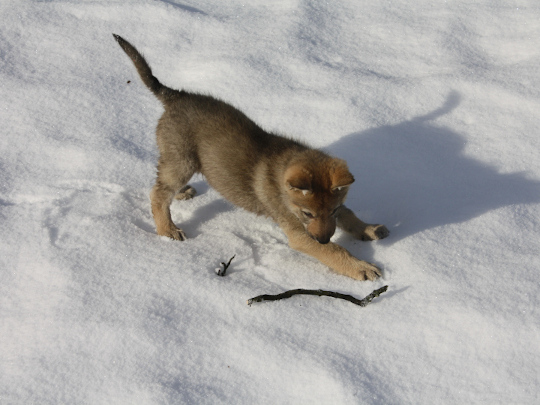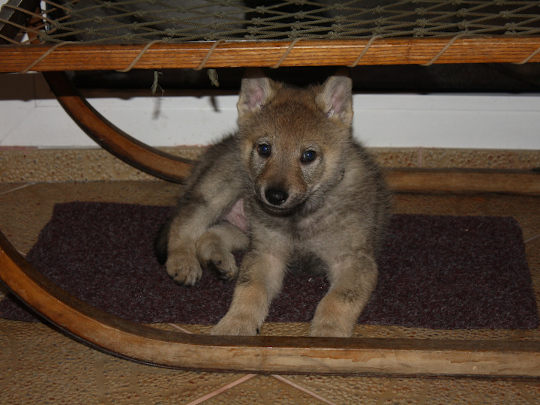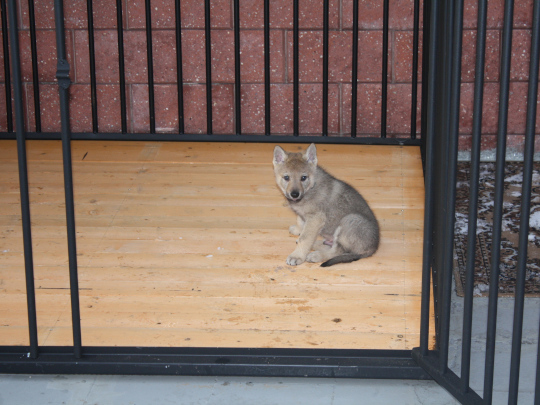Socialization and general development, let your puppy discover the world
Blog | přidáno 19. 1. 2023
Intensive socialization is the smartest investment in your dog“
– Jean Donaldson
Socialization… It’s used in all forms. There’s no end to the socialization walks on the internet and social media. There are almost more dog daycares today than there are daycares for children. But what is socialisation really? What do we mean by it? Let’s take a little more insight in this blog into what socialization really is and how important the general development of a puppy is for its further development and life.
To begin with, it is necessary to think about what is actually the goal of socialization. Is it is to integrate the dog into our world, to create his willingness to cooperate with man, to increase his resistance to external influences and to provide him with the conditions for his physical and mental development, but also the ability to communicate with his own kind, which is very often underestimated.
Innate behaviour
We often hear “it’s innate” But what is innate behavior? The only truly innate behavior is:sucking reflex
nose poking and licking
natural curiosity
rolling over on the back
sniffing
hunting instinct – fox leap
need for a group (pack instinct),
need for authority (adult leadership in a pack).
Everything else we develop by learning. The innate things are directly dependent on learning – on general development. And this should start no later than the 7th-8th week of the puppy’s age.
General development
The development of a dog’s personality needs to be shaped at the earliest age. Already on the way from the breeder to a new pack, the puppy’s development begins. The later you start, the later it can be more complicated later in life. You may ask “so how do I work on general development?” Absolutely the right question. It’s important to remember that the most important element in this stage of puppy development is playing, learning to be active and learning to learn. General development, which goes hand in hand with socialization, is more important at this time, than exercises and obedience, because any building of specific behaviors – exercises – only make sense if the dog is aware of the situation and is able to watch his behaviour. Which is not practically possible with a puppy or a young dog. And this is regardless of breed. Because the brain undergoes (as in humans) a development that ends around 2nd – 3rd year of a dog’s life. This is when a dog can be considered mentally mature. Children, after all, we also raise from infancy to adulthood according to their mental maturity. A small baby, whose world is narrowed down to a milk bottle and a mother we don’t teach to read or to speak. Because we know that his brain is not sufficiently developed. Everything we teach our children, we teach gradually and as they mature and develop mentally. In a way that their developing brains can absorb. So how is it possible that this perfectly logical and natural process of development is not applicable to dogs? A we demand performance worthy of an adult? But back to our puppies. So our job is to develop the puppy and his personality so that he grows up to be a confident dog, adaptable to any external stimulus, able to resolve conflicts, be able to communicate with his companion (in nature he learns this skill from his older siblings or parents) and at the same time we must teach him to communicate with us, bipeds. This is our primary task in the development of our dog. All of this is socialization and general development. It’s the formation of social relationships, the acquisition of social skills, fitting into a social group (and the dog has to fit in both ours, the human one, and the canine one) and it has to learn social roles. And all this takes time. A lot of time and experience, which the dog is gaining every moment of his life. This is the only way to raise a confident, balanced and teachable dog.How dogs learn
Dogs have to experience everything they learn!!Dogs are not smarter than us, but they learn faster and all their lives, every moment, they learn by experience. That’s how nature endowed them. Once they have an experience that brings them a pleasant feeling, they will want to repeat it. Conversely, a bad experience will bring the knowledge of “avoid it”. It’s very important not to cut off their character too soon. You need to let them be a bit of a hooligan. Anyway, as with humans, experience is non-transferable, and if we want to be resilient and mentally toughened, then life has to give us a beating from time to time. You can tell a little kid a thousand times that not to touch the stove. He’s gonna touch it anyway. His innate and natural curiosity. And I think you’ll agree with us that the experience will be such that the child will never touch that stove again. How true, in this case, is the proverb “What doesn’t kill me makes me stronger”… Let your dog “touch the stove”. Let him explore the world through his innate curiosity, let him meet negative stimuli and teach him to deal with it. Let your dog make mistakes, a dog learns by making mistakes. Develop his ability to figure things out for himself. Effort is essential for mental development. We’re developing his independence. And reward him!!! Reward every success, every good behavior, (that’s the good experience) First we give the dog a universal education, we prepare the tools for later training. Once we have these tools ready, we can make our training more specialized in terms of what we expect from our training and only after then comes the college in the form of more specific and more difficult tasks.


